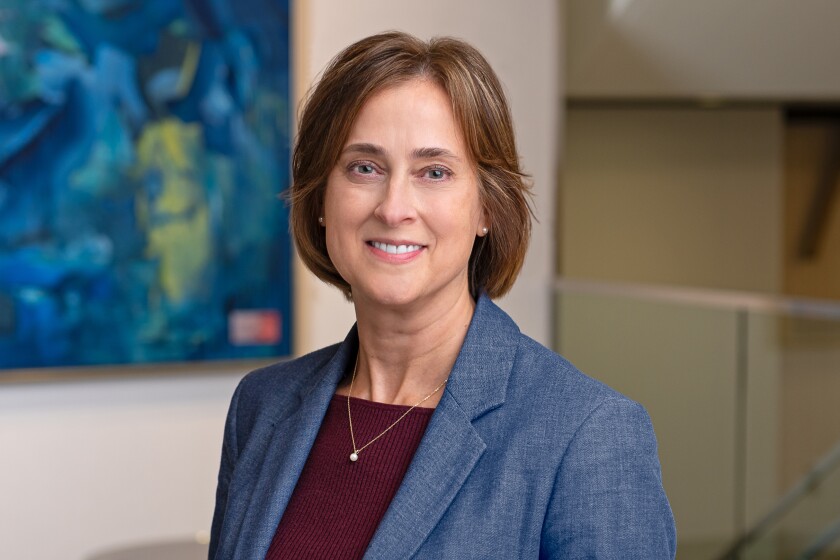ST. CLOUD — On Tuesday, Jan. 28, Dr. Elaina Lee treated 18 children whose parents had concerns about sore throats or cold/flu-like symptoms.
“Can you imagine now, how was I supposed to, at the end of the day, after 18 sore throats and coughs, supposed to remember each individual one?” said Lee, a pediatrician at CentraCare — St. Cloud Hospital. “That’s very hard. This helps me capture the unique features of each story, but I don't have to remember all of that because I can't.”
ADVERTISEMENT
Lee, who has been practicing medicine in St. Cloud since 2001, has embraced using AI — artificial intelligence — in her work.
Specifically, what's called generative AI, which is software that pulls existing information and compiles it into things such as reports.
Lee turns on her phone and records her conversations with patients using a program called The program transcribes the conversation and writes a visit summary. It includes only the information that is spoken during the visit.
In the pediatrics unit at CentraCare Plaza in St. Cloud, Lee is known for championing CentraCare's generative AI programs, encouraging her colleagues to try incorporating the technology into their work.
Why? Because, at the end of the day, she said it allows her to focus on providing her patients with the best possible care instead of all the paperwork that comes with the job.
“It’s allowed me to be more present for my patients and their families and be able to connect with them better, which is so important,” Lee said.
CentraCare, headquartered in St. Cloud, is one of the largest health care systems in Minnesota, with nine hospitals and 30 clinics around the region. CentraCare has encouraged clinicians such as Lee to use generative AI programs to improve patient visit quality and reduce clinician burnout.
ADVERTISEMENT
And they are not alone in the use of AI in Minnesota. The Mayo Clinic has also incorporated AI into the way clinicians treat patients. For instance, the health care system has been researching ways to use AI to improve preventative screenings such as detecting heart defects, according to
However, some uses of AI in health care have lead to concerns: A little over 50% of patients trust AI use in health care, according to a
CentraCare and generative AI
CentraCare official Amy Porwoll said the health care system has been integrating generative AI into patient care since March 2023.
The health care system uses DAX Copilot and Dragon, generative AI software programs developed by Nuance, a subsidiary of Microsoft. The programs pull from patient medical information and visits to create reports and other summaries, said Porwoll, CentraCare's chief information officer.
The software does not gather or share information from outside CentraCare’s records, Porwoll added.
“We work very closely with Microsoft to make sure everything is HIPAA compliant because protecting patient information is very important to us,” Porwoll said.

Porwoll said the use of generative AI is intended to help clinicians provide more efficient and effective care.
ADVERTISEMENT
Generative AI allows patients to get lab test results on the online portal MyChart before they walk into appointments and speak with clinicians, Porwoll said.
However, the use of artificial intelligence has raised some concerns. found that chatbots can echo users' biases, including the racist belief that Black people can tolerate more pain than white people.
Porwoll said that CentraCare has an AI team that reviews bias, equity and ensures that a human will be making the final decisions about medical care.
And if patients catch a mistake on their medical documentation, they can reach out to their clinician to have it corrected, she added.
It’s allowed me to be more present for my patients and their families and be able to connect with them better, which is so important.
Clinicians review and edit reports as needed before turning them in, Porwoll said.
Currently, generative AI is used mainly for outpatient visits. Inpatient visits at the hospital and emergency room visits do not use the software at this time, Porwoll said. CentraCare is looking into ways to expand program use to nurses to help reduce the time they spend filling out documentation.
Clinician burnout and efficiency
Dr. Lynn McFarling is always looking for ways to support clinicians and reduce the mental toll that comes with the job.
ADVERTISEMENT
McFarling, CentraCare's chief medical information officer, has been teaching clinicians how to use generative AI because research has found it can help reduce burnout.

“One of the biggest burdens that our providers face is documentation,” McFarling said. “That [appointment report] note serves not only clinical purposes, but it’s part of how we get paid because insurers look at it all that, so it serves multiple masters, if you will.”
Clinicians saved an average of 4.22 minutes per appointment while using generative AI, according to a recent survey done by CentraCare. Nearly 80% of clinicians also reported an improvement in burnout or fatigue.
McFarling also is an internal medicine doctor at CentraCare and uses generative AI when she treats patients. She said she informs patients about her use of generative AI at the start of their visit, and very few have asked her not to use it. The use of generative AI is voluntary, and CentraCare clinicians have the option to use medical scribes or alternative note-taking methods if they prefer, she added.
“Overall, we’ve received positive feedback from clinicians and patients alike,” McFarling said.
“We’ve had some clinicians request a medical scribe instead but then switch back to using generative AI because of how easier it made visits,” McFarling said.
ADVERTISEMENT
MyChart
Since 2010, CentraCare has worked with Epic — a medical software development company — to create and use an electronic scheduling, billing and system.
The Verona, Wisconsin-based software company also developed MyChart, the access portal all CentraCare patients use to access their information and schedule appointments. Other health care systems also use MyChart, and the program has more than 109 million patient users, according to Taylor Seale, Telehealth & RPM Product Lead at Epic.
Generative AI has been incorporated into MyChart since March 2023 to improve patient experience and make information more accessible, Seale said.

Garrett Adams leads a research and development department at Epic.
“It can be used to help translate all the medical language doctors need to include in reports into something that patients will be able understand,” Adams said. “Generative AI can take medical terms that might sound scary if you just Google them and apply them specifically to the patient so they make more sense.”
MyChart allows users to speak with chatbots to schedule appointments and ask basic questions. When patients use this feature, they are interacting with generative AI, Seale said.
Right now, the generative AI component of MyChart focuses mostly on text, but Epic hopes to incorporate audio and visual elements in the future, according to Adams and Seale.
ADVERTISEMENT
“For example, how have you recovered from your wrist surgery? And then asking you to hold, like, put your hand out and hold it like a waiter holding a tray so it can analyze your movement, range of motion,” Seale said. “Then the software could incorporate that into the responses."
FAQs
Can I ask my doctor to not use generative AI while treating me?
Yes, you can ask your CentraCare clinician to not use a transcription or documentation AI during your visit, said Dr. Lynn McFarling. Clinicians often report that the use of the transcription and documentation software allows them to focus more on patients during visits.
Is my information safe?
Patient information does not leave CentraCare's system. All the information used by generative AI comes from existing records and recorded visits. CentraCare works with Microsoft to ensure that all the software used is HIPAA complaint, according CentraCare CIO Amy Porwoll.
Are CentraCare doctors required to use generative AI?
No, clinicians can use it on a voluntary basis, according to McFarling. At this time, the dictation and report writing features of generative AI are being used only for ambulatory visits at CentraCare. Clinicians have the option to use medical scribes or alternative note-taking methods if they prefer.
Why are health care providers using AI?
CentraCare says that AI helps clinicians focus on treating patients by being more present during visits. The generative AI helps reduce the amount of time clinicians spend doing paperwork. According to a study done by CentraCare, the use of generative AI to record and document patient visits and treatments can help reduce clinician burnout and increase retention.
Glossary
- Generative AI: A type of artificial intelligence that creates new content — such as text, images, or music — by learning from existing data. It mimics patterns to generate realistic outputs for creative and problem-solving tasks.
- HIPAA: The Health Insurance Portability and Accountability Act (HIPAA) is a federal law that protects patients' health information and gives them rights over that information. HIPAA was passed by Congress in 1996.
- Ambulatory visit: A medical service provided to a patient in an outpatient setting, without the need for a hospital stay. Ambulatory care can include diagnosis, treatment, and rehabilitation services.
- Inpatient visit: Patients stay at the hospital during the their treatment.
- DAX Copilot: An AI-powered clinical documentation tool that helps physicians create patient summaries and automate workflows. It's part of the Microsoft Cloud for Healthcare and is developed by Nuance, a Microsoft subsidiary.
- Dragon: A conversational AI workflow assistant enhances clinical and administrative tasks by automating documentation and streamlining processes with advanced features. It is also developed by Nuance.













